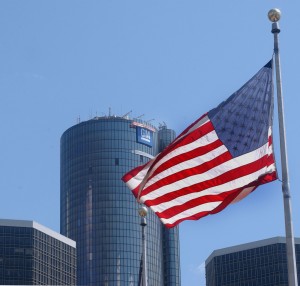The National Highway Traffic Safety Administration today hit General Motors a record-setting $35 million fine. The company agreed to pay it and revise its processes on how it handles reporting safety issues in the future.
The maker confirmed it is being hit with the maximum fine allowed under law as part of a consent decree related to the delayed recall of 2.6 million small cars for ignition switch defects. The defect has been linked to 32 injuries and 13 deaths. GM also confirmed Friday it is struggling to get enough parts to complete that recall by October.
The fines NHTSA is levying as part of the consent decree top those imposed on Toyota Motor Corp. and Ford Motor Co. Ford was fined $17.35 million for failing to inform the owners 423,000 2001-04 Ford Escapes and Mazda Tributes of a defect in a timely manner in July 2012.
Toyota accrued more than $50 million in fines in three instances over a multi-year period for failing to recall vehicles in a timely manner.
GM issued six more recalls during just the past two days, five of them yesterday covering a total of 2.7 million vehicles for problems ranging from failing brake lamps and headlights to a loss of steering on full-size trucks. Friday’s smaller recall impacted just 8,200 vehicles. In all, GM has now recalled 11.5 million vehicles since the beginning of 2014, more than at any time in its history — and more than half of the total industry recall count for all of 2013.
In a separate announcement on Friday, the automaker noted that it is unlikely to get all of the defective ignition switches replaced by the October timeline it initially laid out. The supplier of the switch, Delphi Corp., has one line running seven days a week right now and is in the process of setting up two more lines to meet the demand. However, the automaker has issued so many recalls this year, it’s taxing the entire infrastructure used to make the fixes: parts can only be made so quickly, dealers can only perform the repairs at a certain pace that it’s impossible to get the ignition switch repairs completed in time.
Aside from the fines and additional recalls, the automaker is also subject to investigations by the Justice Department, two congressional committees and the Transportation Department’s inspector general regarding the GM recall.
In fact, General Motors’ board of directors has hired a law firm to conduct an investigation of the company’s handling of recalls, triggered by complaints about vehicle safety.
Directors apparently never fully briefed on the troubles with small cars stalling due to a faulty ignition-switch that has contributed to 13 deaths and the recall of 2.6 million vehicles.
Mary Barra, GM’s chief executive officer, has retained a former U.S. prosecutor, Anton Valukas to investigate the circumstances around the failure sooner despite the concerns of GM’s own engineers and engineers from Delphi Corp., the supplier of the switch. Valukas report could lead to disciplinary charges and or the dismissal of GM personnel that handled the matter.
Valukas’ report, which is due to be made public before GM’s annual shareholders meeting next month, also is expected to contain a fuller and more extensive explanation of the why the recall was not ordered sooner, according to Barra.
GM’s directors want their review to ensure that future vehicle safety issues move more quickly to their attention through the automaker’s management, according to The Wall Street Journal. The board hired prominent New York law firm Wachtell, Lipton, Rosen & Katz to conduct the investigation.
Theodore “Tim” Solso, who took over the role of GM chairman Dan Akerson back in January is also apparently playing a larger role in sorting out the automaker’s response to the recall controversy, which has led to the retirement or resignation of a growing list of GM executives.
(Consent decree could help GM move past recalls. For more, Click Here.)
GM is also facing investigations by the U.S. Justice Department, which is looking into complaints that GM officials deliberately misled federal safety regulators, and two Congressional committees, which are expected to recommend tightening up the safety regulations for all automakers.
Meanwhile, cost of the recalls and investigations is steadily growing for GM, which is rebuilding its finances after filing for bankruptcy in 2009.
(Click Here for details on GM recalling an additional 2.7 million vehicles.)
Demonstrating a heightened sensitivity to vehicle defects, GM announced five new recalls, involving more than 2.7 million vehicles. GM said it had already logged several hundred complaints about the problems addressed in the recalls, which involved thousands of the company’s most prominent vehicles among the Chevrolet Malibu, the Chevrolet Corvette and Cadillac CTS.
(To see what Rolls-Royce plans to do regarding a “proper SUV,” Click Here.)
GM said the latest recall would result in a $200 million charge against earnings in the second quarter. GM took a $1.3 billion charge against earnings in the first quarter for the ignition switch recall and to reimburse dealers for offering loaner vehicles to customers who brought vehicles in for repairs.
The charges against earnings, however, do not cover GM’s growing bill for lawyers and outside consultants that have been brought in to help deal with the controversy. So far, however, GM has managed to escape damage to its sales, having managed to eke out a small increase in market share during April.
Joseph Szczesny contributed to this report.

